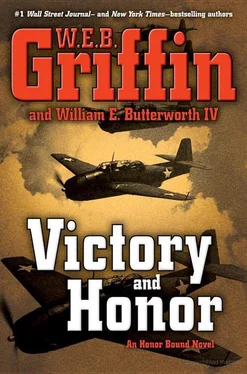“You have the aircraft, First Officer,” Clete said, and took his hands off the yoke.
“He sounded like an American,” von Wachtstein said.
“This is an American air base,” Frade replied. “One of our smaller ones.”
After they touched down, von Wachtstein looked around in awe, and said, “One of your smaller airfields?”
They were trailing a FOLLOW ME jeep down a taxiway lined on both sides as far as they could see with far-too-many-to-count four-engined Consolidated B-24 bombers parked wingtip to wingtip.
“The larger ones are really crowded,” Clete replied.
“What’s going on here?”
“This base served two major roles,” Clete said. “One, as a home base for B-24s looking for submarines and German—or allegedly neutral—merchant vessels, and, two, as a jump-off point for aircraft headed for Europe via Sierra Leone in West Africa.”
“There’s another Connie,” von Wachtstein said as they came close to the transient aircraft tarmac.
The airplane bore the markings of the U.S. Army Air Forces.
Frade thought: I wonder what the hell that’s doing here?
Did Graham or Dulles—or even Donovan—come down here to see me?
If that’s the case, the odds are I’m not going to like what they have to say.
As ground handlers wanded the Ciudad de Rosario into a parking spot beside the other Connie, Frade picked up his microphone again.
“Val de Cans tower, this is South American Airways Double Zero Nine. I’m sitting on the transient tarmac. Can you get a ladder out here to the cockpit door before, repeat before, you put a ladder up to the passenger door?”
“No problem, South American Double Zero Nine. Where’d you get the American accent?”
The flight-planning room was deserted except for an Air Forces lieutenant and a plump sergeant. They were sitting at sort of a counter. A weather map and a flight schedule chart were mounted on the wall behind them.
“Sorry,” the sergeant greeted them, more or less courteously, “but this is for Americans only.”
“Not a problem,” Frade said, then looked at the officer. “Are you the AOD, Lieutenant?”
Frade was wearing the red-striped powder-blue trousers of an SAA captain, but had replaced the SAA tunic with a fur-collared leather jacket on which was a leather patch with Naval Aviator Wings and the legend FRADE, C H ILT, USMCR. He also had replaced the ornate, high-crowned SAA uniform cap with the Stetson hat his uncle Jim had been wearing when he dropped dead in the Midland Petroleum Club.
The lieutenant, whose face showed his confusion at what stood before him, shook his head and then asked, “You’re from that Argentine airliner?”
“Figured that out, did you?” Clete said. “How about getting the AOD down here for me?”
Clete, who had done many tours as an AOD—aerodrome officer of the day—understood that at a little after two in the morning most AODs would be curled up on a cot and would tend to be annoyed if awakened to deal with anything less than the field being attacked by Martians. And AODs were usually senior to the officer in charge of the flight-planning room.
One of the stage directions Director Frade had issued to his cast was that when he issued an order, the reply would be in the same language used to issue the order. So, when he next said in German, “Hansel, you and Karl take a look at the weather map,” von Wachtstein replied, “Jawohl, Herr Oberst . ” Then both headed for the weather map behind the counter.
This tended to further confuse the lieutenant and the sergeant. But the former retained enough of his composure to proclaim, “Hey, you can’t go back there!”
“Don’t be absurd, Sergeant,” Frade said.
“The colonel told you to get the AOD down here, Lieutenant,” Siggie Stein snapped. “Do it.”
“Easy, Siggie,” Frade said.
Frade then extended to the lieutenant the credentials identifying him as an OSS area director.
“Not only weren’t we here, but I didn’t show you that,” Frade said. “Understood, Lieutenant?”
The lieutenant was clearly dazzled by the spurious credentials.
“Yes, sir,” the lieutenant said. “Sergeant, go get Major Cronin.”
Frade impatiently gestured for the lieutenant to return his credentials. The lieutenant hastily did so.
Major Cronin, a nice-looking young officer wearing pilot’s wings, appeared two minutes later, looking somewhat sleepy eyed.
“You’re off that Argentine Constellation, right?” he said.
“Correct,” Frade said. He extended his credentials. “Take a quick look at that, please, Major, and then forget you ever saw it or us.”
Major Cronin looked, then said, “Yes, sir. And what can Val de Cans do for the OSS?”
“You can start, Major, first things first, by getting someone from your radio maintenance section familiar with the Collins 7.2 transceiver up here to assist my communications officer. The 7.2 in my Connie needs service.”
Major Cronin looked confused. “Excuse me, sir . . . what do I call you?”
“‘Sir’ will do just fine,” Frade said.
“Sir, I’m a little confused. The Collins 7.2 is a fixed-station communications device. Are you sure that’s what you have in your aircraft?”
“Trust the colonel, Major, when he says we have one in our airplane,” Stein said.
“Yes, sir,” the major said, and then turned to the lieutenant. “Charley, why don’t you run over to the radio shack and get someone familiar with the 7.2 over here.”
“Better yet, Lieutenant,” Stein said, “why don’t I go with you to the radio shack?”
“Yes, sir,” the major and the lieutenant said in chorus.
“All right, sir?” Stein asked.
“Carry on, Stein,” Frade ordered.
Von Wachtstein and Boltitz returned from the weather map.
“Looks pretty good, Clete,” von Wachtstein announced in German. “A couple of minor storms to the south. The winds aloft will be on our tail.”
“Danke schön,” Frade replied.
Von Wachtstein and Boltitz then moved behind Frade and took up positions roughly like that of Parade Rest.
The major and the lieutenant looked intently at them.
“I presume you have been officially informed,” Frade said, “that the SAA Constellation is bound for Germany to relieve the Argentine diplomatic staff in Berlin.”
“We’ve been expecting you, Colonel,” the major said.
“Please do not use my rank,” Frade said.
“Sorry, sir.”
“That mission of compassion and mercy, however, is not the only reason I and these members of my staff are going to Germany. The second mission is unknown, as is my association with the OSS, to the Argentine diplomats, and I wish it kept that way. Understood?”
“Yes, sir,” the major and the lieutenant again said together.
“I wish to discuss the second mission with the officer, or officers, commanding the B-24 submarine hunting group. Is that one officer or two?”
“Actually, sir, it’s four. In the wing, there are two antisubmarine groups here, and a third, the 480th, at Port Lyautey, in Morocco. Three group commanders, colonels, and the brigadier general who commands the wing, sir.”
“The general is where?” Clete asked.
“Here, sir. In his quarters.”
“Let’s start with him. Would you get him on the phone, Major, offer my apologies for waking him up, and ask him to come down here?”
“Yes, sir. And who do I say, sir, wishes to see him?”
“Tell him anything you wish, so long as you don’t mention the OSS.”
“Can I mention South American Airways?”
“Why not?”
Читать дальше












